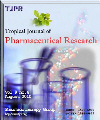
|
Tropical Journal of Pharmaceutical Research
Pharmacotherapy Group, Faculty of Pharmacy, University of Benin, Benin City, Nigeria
ISSN: 1596-5996
EISSN: 1596-5996
Vol. 16, No. 6, 2017, pp. 1239-1244
|
 Bioline Code: pr17158
Bioline Code: pr17158
Full paper language: English
Document type: Research Article
Document available free of charge
|
|
|
Tropical Journal of Pharmaceutical Research, Vol. 16, No. 6, 2017, pp. 1239-1244
| en |
Herbal carrier-based floating microparticles of diltiazem hydrochloride for improved cardiac activity
Zhou, Yun; Zhang, Min-Li; Yuan, Bai-Jing; Yuan, Jin-qi; Zhao, Xin-Fang; Zhao, Li & Ren, Hong-Qiang
Abstract
Purpose: To formulate and characterize a gastroretentive floating drug delivery system for diltiazem
hydrochloride using psyllium husk and sodium alginate as natural herbal carriers to improve the
therapeutic effect of the drug in cardiac patients.
Methods: Floating microparticles containing diltiazem hydrochloride were prepared by the orifice ionic
gelation technique. Various physicochemical properties of the floating microspheres were characterized,
including drug content, particle size, surface morphology, in vitro drug release, and in vivo
antihypertensive effect.
Results: The diltiazem hydrochloride microparticles exhibited a high drug content ranging from 63.23 ±
1.14 to 85.56 % ± 1.14 %. The particle size was 891.40 ± 2.14, 928.40 ± 1.79, 900.65 ± 2.22, and
1345.40 ± 1.36 μm (p < 0.05 compared to blank microspheres for formulations FDD1, FDD2, FDD3,
and FFD4), respectively. Scanning electron microscopy showed that all the formulations had a smooth
spherical surface with little pores and few cracks. The maximum floatability value was 83.11 % ± 3.18 %
for FDD1. All of the formulations showed good in vitro drug release profiles, with a maximum release of
87.4 % of the drug at the end of 12 hours. The in vivo antihypertensive effects of the microparticles in
human subjects were significant (p < 0.05 compared to normal controls), with a reduction in diastolic
blood pressure from 120 to 78 mmHg at the end of 4 hours compared to diltiazem sustained-release
tablets.
Conclusion: Psyllium husk and sodium alginate-based microspheres can be suitably prepared for the
controlled delivery of diltiazem hydrochloride to cardiac patients. However, further study is required to
develop the delivery system.
Keywords
Diltiazem; Cardiac disease; Psyllium husk; Sodium alginate; Microsphere; Microparticle; Controlled drug release; Gastroretentive; Floating drug delivery
|
| |
© Copyright 2017 - Pharmacotherapy Group, Faculty of Pharmacy, University of Benin, Benin City, 300001 Nigeria.
Alternative site location: http://www.tjpr.org
|
|
